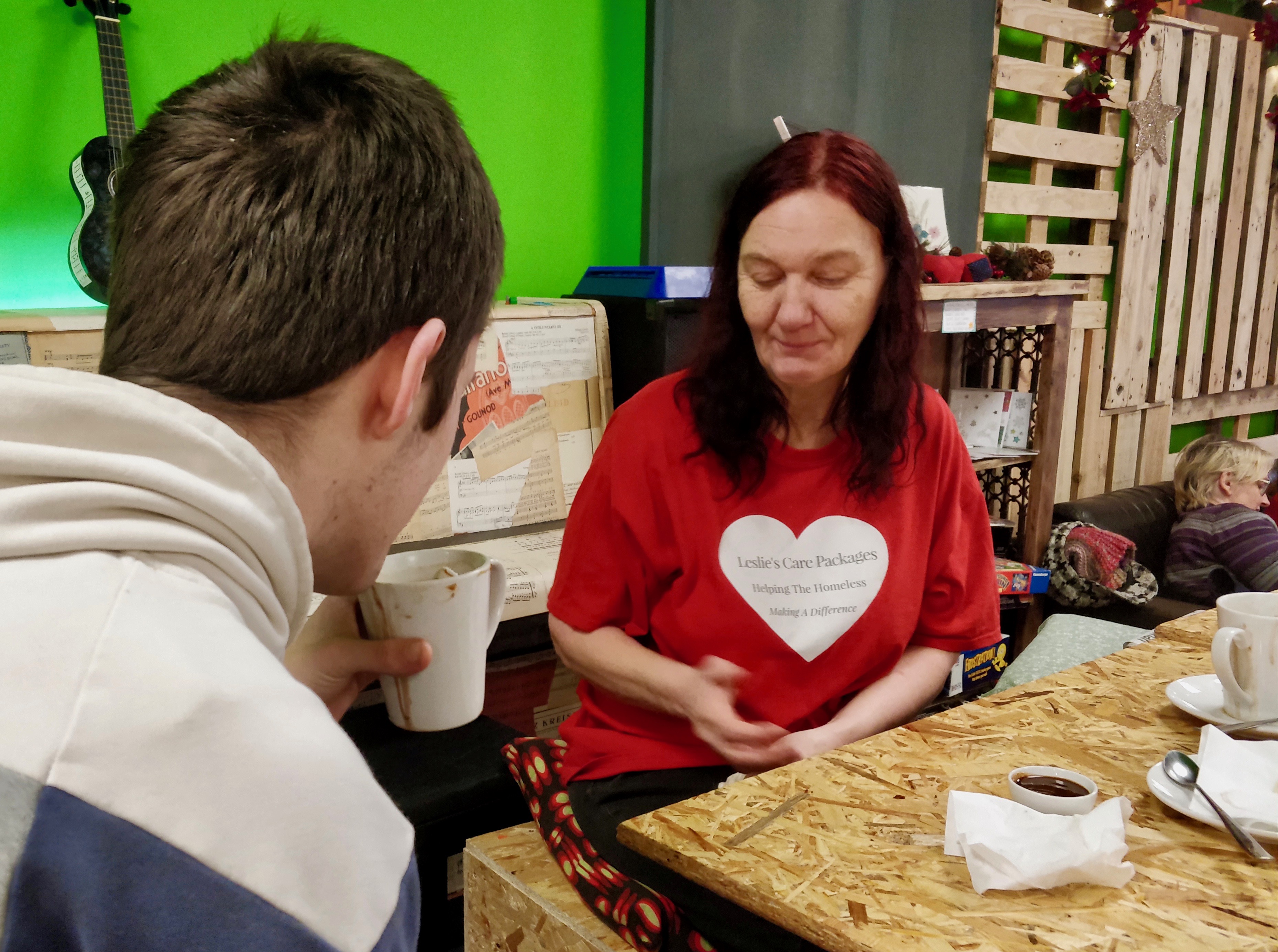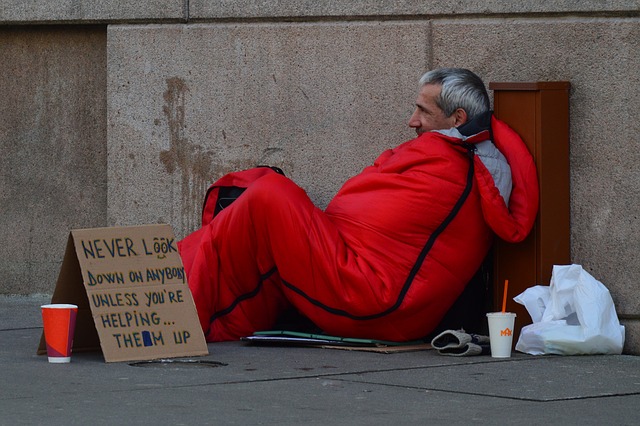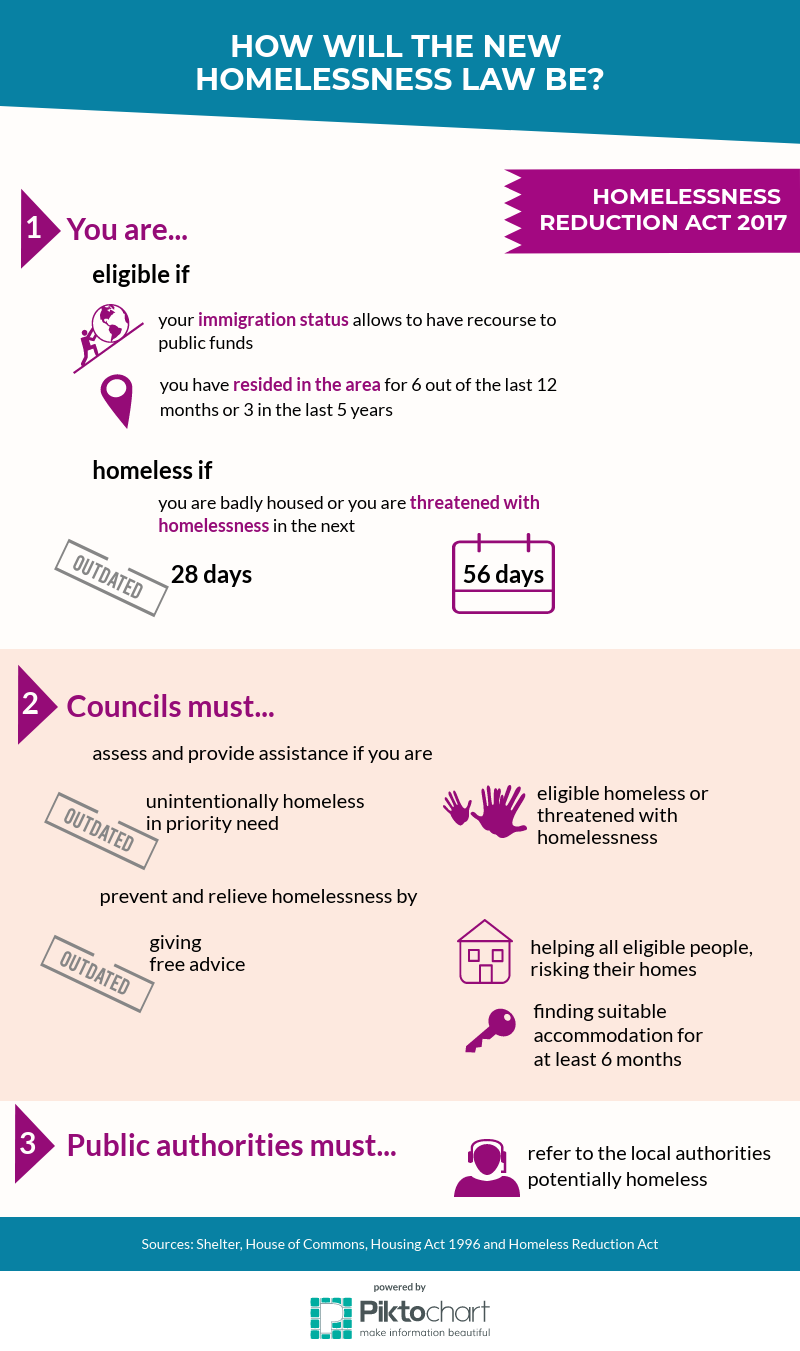The city has kept the top position since 2015, but changes in the law will increase the pressure on local authorities.
“I don’t trust anybody. I used to have friends, but not anymore. I don’t trust them”. Josh, 22, was rough sleeping behind the Dudley Council building for seven months.
“My mom just lives around the corner, but she won’t help me out with nothing,” he says, with his strong Black Country accent, nervously moving.
Josh, who suffers from anxiety and paranoia, is the second oldest of a family of five children, “and the smartest,” as he says, proud and smiling, “because I have my own place” to live.
After being “kicked out of a hostel due to my aggression,” he was offered emergency accommodation by the local authority in December, but in Oldbury; 30 minutes away from his home town.
“He was reluctant to take it because it is based out of Dudley”, says Vi Wood, the only person in whom Josh now trusts.
 Josh and Vi Wood at Gather café, where there is a “pay forward” initiative – Carmen Aguilar
Josh and Vi Wood at Gather café, where there is a “pay forward” initiative – Carmen Aguilar
Wood is the founder of “Leslie’s care packages for the homeless”, a local organisation created after she nearly became herself homeless. Since 2016 she has been collecting goods for people in need. “She needs to take a break (from helping people) once in a while”, Josh jokes.
He was finally convinced to accept the place offered by Dudley Council. The town had the lowest rate of homelessness across England in the second quarter of 2017 (July-September), but among those that the law classed as homeless, clarifies charity Homeless Link.
Source: Department for Communities and Local Government
Only one out of 20 people who applied for housing in Dudley was prioritised and provide with accommodation by the local administration, according to Department for Communities and Local Government figures.
But the actual legislation only assists the most vulnerable homeless. A new change in the law will increase authorities’ duties. Housing activists, however, warn about the need for increasing the resources and collaborating between councils and charities to comply with it.
Three years in the lead
Dudley has kept the top position since 2015, and since 2011 its rate does not overtake the two digits. It is the only town in the Black Country that has reduced the rate in the last seven years.
“Dudley provides a very successful early intervention approach to preventing homelessness”, said the Council. “As a result, the number of people who go on to be accepted as homeless is low”, they added.
Source: Department for Communities and Local Government
But local authorities in England are only obliged to accommodate those who are considered “unintentionally homeless”, so, who have not done anything that caused them to be homeless; and “in priority need”. This mainly includes families with children, pregnant women, victims of domestic violence, people in an emergency after a disaster or who have mental problems or disabilities.
If they are classed “not in priority need”, the local administration must give them advice. “However, we frequently provide support beyond the government guidelines,” says Dudley Council.
Source: Department for Communities and Local Government
And those “not in priority need” made up almost a third out of all housing applicants in Dudley during the second quarter, a figure that has risen 133% over the last 5 years.
Volunteers are “filling the gap”
“I work with the ones that are ‘not in priority need’ because they are single male or young people without children” among others, says Matthieu Lambert, Black Country executive director of Hope into Action, a church-based group that fights homelessness and gives support to vulnerable people.
Charities, churches, voluntary sector and food banks take care of those not prioritised, points out Faye Hall, Project coordinator of Dudley Young Health Champions.
“Local authorities rely on volunteering sector to fill the gap” caused by cuts in social funding, says Hall. “Now, after years, they realised that they have to fund the volunteers extra to do that”, she adds.
 Faye Hall in Gartner café, a place that gathers people from the volunteer sector– Carmen Aguilar
Faye Hall in Gartner café, a place that gathers people from the volunteer sector– Carmen Aguilar
But “while provisions are going down,” says Matthieu Lambert, they are seeing “an increasing pressure” in their services; people demanding more and more help, who are not shown in statistics.
The governmental homelessness figures “have no correspondence with the situation on the ground”, he warns. The numbers only represent those who approach a local authority.
 Homeless - Quinn Kampschroer, Pixabay
Homeless - Quinn Kampschroer, Pixabay
“In many of the overcrowded accommodation, people who officially are living there are only a part of those actually living”, Lambert says.
And there is a “vast number who is relying on the generosity of others and they are not anywhere in the system” or people who simply “don’t tell anybody that they don’t have anywhere to live” or they are migrants and not eligible for housing, he adds.
Vi Wood risked being homeless precisely because of her migrant status.
German, but married to a British citizen and living in Dudley since 2002, she was “put on immigration control (by Dudley authorities) and said that I have to prove my working status” after her husband´s death.
This #parcel has been delivered for residents at a #supportedhousing in #Netherton thanks again for all the kind #donations xx pic.twitter.com/2RGVGywDTj
— Leslie's Care Packages (@Vi2015UK) 28 de diciembre de 2017
“I was put through grieving and fighting for my own home”, she says. And in August 2016, she decided to keep her husband's memory alive by collecting goods and giving them to people in need.
“I set up then the Facebook page “Leslie’s care packages for the homeless”, start to ask my friends for donations, and take it to the people in need. And, to be honest, from day one it was amazing,” she explains.
Wood has won two local prizes since then, and she is one of the finalist of the Big Thank You Awards 2017. But what is more important is that “people donate every day and it’s expanding”, she adds.
The new law for England
The Homelessness Reduction Act will become effective in April 2018, what will increase the obligations of local authorities in England.
It is an amendment to the actual Housing Act 1996 Part VII and it is based on the one introduced in Wales. Among its main changes which stand out are an earlier intervention and a new duty for local authorities to provide accommodation regardless intentionality, priority need or local connection.
That will increase the number of people helped by local administrations. With this new legislation, Dudley's homelessness rate would have been almost 8 out of 20 instead of one out of 20.

“They (local authorities) will have to do more work for anybody who comes to them and is homeless” than they are doing now, explains Vicky Hines, Shelter’s Birmingham Hub manager. “But that will not necessarily mean that they put them in a house straight away”.
When a person is prioritised for housing and there is no available accommodation, s/he is sent to a temporary one until the local administration can get a permanent one.
“The problem is the supply of accommodation”, says Hines. “Local authorities are in an immense pressure to get permanent accommodation”, and “unless we get more units of affordable accommodation, the problem will continue”, she adds.
According to the Statutory Homelessness in England 2017 report, almost two-thirds (64%) of councils are struggling to find social tenancies and the temporary accommodation has risen 48% in England and 64% in Birmingham between 2010 and 2016.
Collaboration at local level
Despite the government pledging 72.7 million to cover the first two years of the Act, the Association of Housing Advice Services estimated that London councils alone could need £161m, says the report “Comparison of homelessness duties in England, Wales, Scotland and Northern Ireland”.
“We urge the Government to support the Homelessness Reduction Act with a well-resourced, cross-departmental homelessness strategy, that addresses the root causes of homelessness”, commented the Homeless Link's Chief Executive, Rick Henderson, on October.
 These are Andrew’s belongings, rough sleeping in High Street, Dudley – Carmen Aguilar
These are Andrew’s belongings, rough sleeping in High Street, Dudley – Carmen Aguilar
Council “staff are being trained and we hope to be prepared for the implementation” of the law by April, says Dudley authority.
But it is “absolutely impossible for a local authority on its own to comply with the statutory requirement of the new legislation”, considers Lambert from Hope in Action.
He thinks that councils “will have to be more reliant on a partnership with charities and volunteering sector to identify the needs of each individual and build support around them”.
“Maybe authorities offer a place to stay in Birmingham, but they (homeless people) don’t want to leave their own hometown” as Josh’s case, explains Vi Wood. “So, they refuse, and then authorities think that they made themselves homeless. But ask why they refuse!”
Josh wishes he was living in Dudley, but “I’m going to keep encouraging him to stay in that place” until he can be moved to his home town, she says.
They have also plans for the future: making Josh a volunteer in Wood’s organisation. A way to “give him some responsibility”, she says while she finishes off quickly her chocolate.
Times goes by and they have to run to their next appointment with the Summit Support House, an institution that help vulnerable people to recover their lives.
Wood is determined to support Josh and he is taking her hand.
“I have my brain switched on (…) I make sure I was fed every day, I´ve fluids and I´ve fit clothes and all that”, tells Josh. “I´m smart. I’m 22. I’m in my prime”.


